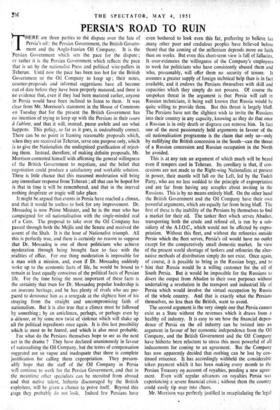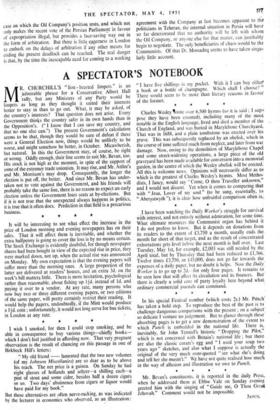PERSIA'S ROAD TO RUIN
HERE are three parties to the dispute over the fate of Persia's oil: the Persian Government, the British Govern- ment and the Anglo-Iranian Oil Company. It is the Persian Government which sets the pace for the dispute ; or rather it is the Persian Government which reflects the pace that is set by the nationalist Press and political wire-pullers in Teheran. Until now the pace has been too hot for the British Government or the Oil Company to keep up ; their notes, counter-proposals and informal suggestions have all become out of date before they have been properly matured; and there is no evidence that, even if they had been matured earlier, anyone in Persia would have been inclined to listen to them. It was clear from Mr. Morrison's statement in the House of Commons on Tuesday that for the present the British Government has no intention of trying to keep up with the Persians in their tours a rabime, and that it will, instead, pause awhile and see what happens. This policy, so far as it goes, is undoubtedly correct. There can be no point in framing reasonable proposals which, when they are received in Teheran, serve one purpose only, which is to give the Nationalists the undisguised gratification of reject- ing them. Instead, therefore, of making definite proposals, Mr. Morrison contented himself with affirming the general willingness of the British Government to negotiate, and the belief that negotiation could produce a satisfactory and workable solution. There is little chance that this reasoned moderation will bring any immediate response from Teheran ; all that can be hoped for is that in time it will be remembered, and that in the interval nothing desperate or tragic will take place.
It might be argued that events in Persia have reached a climax. and that it would be useless to look for any improvement. Dr. Mossadeq is now Prime Minister, and he is the man who has campaigned for oil nationalisation with the single-minded zeal of a Cato. The proposal to take over the Oil Company has passed through both the Mejlis and the Senate and received the assent of the Shah. It is the hour of Nationalist triumph. All this is perfectly true, and there is certainly no reason to suppose that Dr. Mossadeq is one of those politicians who achieve moderation through being brought face to face with the lealities of office. For one thing moderation is impossible for a man with a mission, and, even if Dr. Mossadeq suddenly woke up to the economic facts of life, he would be bound to remain at least equally conscious of the political facts of Persian life. For the time being the most important of these facts is the certainty that teen for Dr. Mossadeq popular leadership is an insecure heritage, and he has plenty of rivals who are pre- pared to denounce him as a renegade at the slightest hint of his straying from the straight and uncompromising faith of nationalism. But it is also true that a climax must be followed by something ; by an anticlimax, perhaps, or perhaps even by a detente, or by some new twist of violence which will shake up all the political ingredients once again. It is this last possibility which is most to be feared, and which is also most probable.
For what do the Persians themselves hope to see as-the next act in the drarha ? They have declared unanimously in favour of nationalising the Oil Company, but the terms of compensation suggested are so vague and inadequate that there is complete justification for calling them expropriation. They presum- ably hope that the staff of the Oil Company in Persia will continue to work for the Persian Government, and that in the meantime other specialists can be recruited from abroad and that native talent, hitherto discouraged by the British exploiters, will be given a chance to prove itself. Beyond this stage they probably do not look. Indeed few Persians have even bothered to look even this far, preferring to believe (as .many other poor and credulous peoples have believed before them) that the coming of the millenium depends more on faith than on works. But even this short-term view is full of fallacies. It over-estimates the willingness of the Company's employees to work for politicians who have consistently abused them and who, presumably, will offer them no security of tenure. It assumes a greater supply of foreign technical help than is in fact available, and it endows the Persians themselves with skill and capacities which they simply do not possess. Of course the unspoken threat in the argument is that Persia will call in Russian technicians, it, being well known that Russia would be quite willing to provide them. But this threat is largely bluff.
The Persians have not the slightest wish to invite the Russians into their country in any capacity, knowing as they do that once a Russian is in only death or disgrace can remove him. In fact one of the most passionately held arguments in favour of the oil nationalisation programme is the claim that only so—only by nullifying the British concession in the South—can the threat of a Russian concession and Russian occupation in the North be avoided.
This is at any rate an argument of which much will be heard even if tempers cool in Teheran. Its corollary is that, if con- cessions are not made to the Right-wing Nationalists at present in power, their mantle will fall on the Left, led by the Tudeh Party, who are no less wedded to the principle of expropriation and are far from having any scruples about inviting in the Russians. This is by no means entirely bluff. On the other hand the British Government and the Oil Company have their own powerful arguments, which are equally far from being bluff. The first of these is the inability of the Persians by themselves to find a market for their oil. The tanker fleet which serves Abadan, transporting both the crude and refined oil, is run by a sub- sidiary of the A.I.O.C., which would not be affected by expro- priation. Without this fleet, and without the refineries outside Persia which the fleet serves, Persia's oil would have no outlet except for the comparatively small domestic market. In view of the present world shortage of tankers and refineries the alter- native methods of distribution simply do not exist. Once again, of course, it is possible to bring in the Russian bogy, and to hint that Russia would be a willing customer for the oil of South Persia. But it would be impossible for the Russians to divert the output from Abadan to their own purposes without undertaking a revolution in the transport and industrial life of Persia which would involve the virtual occupation by Russia of the whole country. And that is exactly what the Persians themselves, no less than the British, want to avoid.
The second argument is the very simple one that Persia cannot exist as a State without the revenues which it draws from a healthy oil industry. It is easy to see how the financial depen- dence of Persia" on the oil industry can be twisted into an argument in favour of her economic independence from the Oil Company, and the British Government and the Oil Company have hitherto been reluctant to stress this most powerful of all inducements for coming to an agreement. But the Company has now apparently decided that .nothing can be lost by con- tinued reticence. IS has accordingly withheld the considerable token payment which it has been making every month to the Persian Treasury 9 account of royalties, pending a new agree- ment. Even with regular advances on royalties Persia was experiencing a severe financial crisis ; without them the country could easily tip over into chaos.
Mr. Morrison was perfectly justified in recapitulating the legal case on which the Oil Company's position rests, and which not only makes the recent vote of the Persian Parliament in favour of expropriation illegal, but provides a face-saving way out in the form of arbitration. But there is little eagerness in London to embark on the delays of arbitration if any other means for ending the present deadlock can be reached. The real danger is that, by the time the inescapable need for coming to a working agreement with the Company at last becomes apparent to did politicians in Teheran, the internal- situation in Persia will have so far ',deteriorated that no authority will be left with whom the Oil Company, or anyone else for that matter, can justifiably begin to negotiate. The only beneficiaries of chaos would be tho Communists. Of that Dr. Mossadeq seems to have taken singu. larly little account.



































 Previous page
Previous page